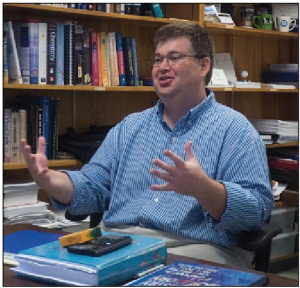By Renee Xiaoyu Wang || Contributing Writer

Scott Brewer, Associate Professor of Chemistry, was recently named a Henry Dreyfus Scholar-Teacher for his research project, “Exploring Protein Structure and Hydration with Spectroscopic Reporter Unnatural Amino Acids and Modified Nucleosides,” with a research grant of $60,000.
The award is provided by the Camille & Henry Dreyfus Foundation, which encourages young faculty to further their researching career in chemistry science at undergraduate institutions.
“This award not only recognizes my previous accomplishments, but also provides funds to support the research moving forward,” said Professor Brewer. He continues to regard this honor as an encouragement to enhance his career.
Brewer’s research project aims to develop a new tool to study protein structure and dynamics. Through organic synthesis, small, non-intrusive probes are used to modify amino acids. Using molecular biology and biochemistry techniques, those modified amino acids are incorporated into the protein system. With vibrational spectroscopy, local environment of the probes in the protein system, as well as their dynamics, can be determined. Professor Brewer is able to predict the unknown protein system based on calibrated models.
The greatest challenge of this project is that there is no one probe that is ideal for all proteins. Brewer explained, “If you have a toolbox with all kinds of different tools, and you might have three screwdrivers in three different sizes, then depending on different jobs, you will need different tools.”
“The challenge is to determine the advantages and disadvantages for each probe, and with that knowledge, then we have to figure which probe is best for which application,” he continued.
The project has a promising future in understanding pathological changes due to abnormal protein dynamics. A normal protein is made of a chain of amino acids that fold into a globular shape in three-dimension. However, sometimes some proteins self-associate with other protein molecules to form long oligomers. Depending on the protein, those oligomers may lead to many protein-folding diseases, such as Alzheimer’s Disease, which is the accumulation of plaques of insoluble b-amyloid in the brain.
Brewer emphasized the role of teamwork in this research project by bringing students from different disciplines of chemistry to help advance the process. He enjoyed involving students and hoped to give them the academic experience that may assist them in their future education. According to Brewer, the grant has been used to help fund the lab, buy necessary equipment, and pay student salaries.
He encourages the students to take advantage of the great opportunities at F&M, and maximize your academic experience, and most of all, to take ownership of their education.
Renee Xiaoyu Wang is a contributing writer. Her email is xwang2@fandm.edu.